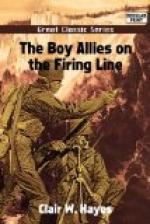In escaping from Germany, each had done his full share of fighting and each had been wounded. They had finally reached Brussels, where they remained some time, while Hal’s wound healed sufficiently to continue his homeward journey. As the result of their heroic actions, the Belgian commander at Liege had mentioned them so favorably in his report to King Albert, that he had bestowed upon them commissions as lieutenants in the Belgian army as a mark of distinction for their bravery.
It was while waiting in Brussels that they again encountered Lieutenant Anderson, from whom they had been separated, and it was through his inducement that they now found themselves attached to the staff of Field Marshal Sir John French, commander of the British forces on the continent, engaged in scout duty.
At the time when this story opens they had been sent in advance of the main army on a reconnaissance.
The German advance through Belgium into France, up to this time, had been steady, although the Allies had contested every foot of the ground. Day after day and night after night the hard pressed British troops, to which Hal and Chester were attached, had borne the brunt of the fighting. But for the heroism of these comparatively few English, slightly more than one hundred thousand men, the Germans probably would have marched to the very gates of Paris.
But the arrival of the British troops had been timely, and under the gallant command of Sir John French, they had checked the overwhelming numbers of Germans time after time. The bravery of these English troops under a galling fire and against fearful odds is one of the greatest military achievements of the world’s history.
Slowly, but standing up to the enemy like the true sons of Great Britain always have done, they were forced back. They stood for hours, without sight of the enemy, men dropping on all sides under the fearful fire of the great German guns miles away. While the French, farther south, gave way more rapidly, these few English stood their ground.
Time after time they came to hand grips with the enemy, and at the point of the bayonet drove them back with terrible losses. These bayonet charges were things of wonder to Hal and Chester in spite of the fact that they had been in the midst of similar actions before Liege.
As the French and Belgians advanced in a wild whirlwind of fury, the English went about the business of a charge more deliberately, though with the same savage determination. They charged swiftly, but more coolly; gallantly, but more seriously, and the effect of their charges was terrible. The Germans who came on in the face of the fierce rifle and artillery fire, could not face the British bayonets, and time after time were driven back in disorder.
And as the British charged, always the words of their battle-song, fated for some unfathomed reason to become historic, rose above the sounds of battle:




